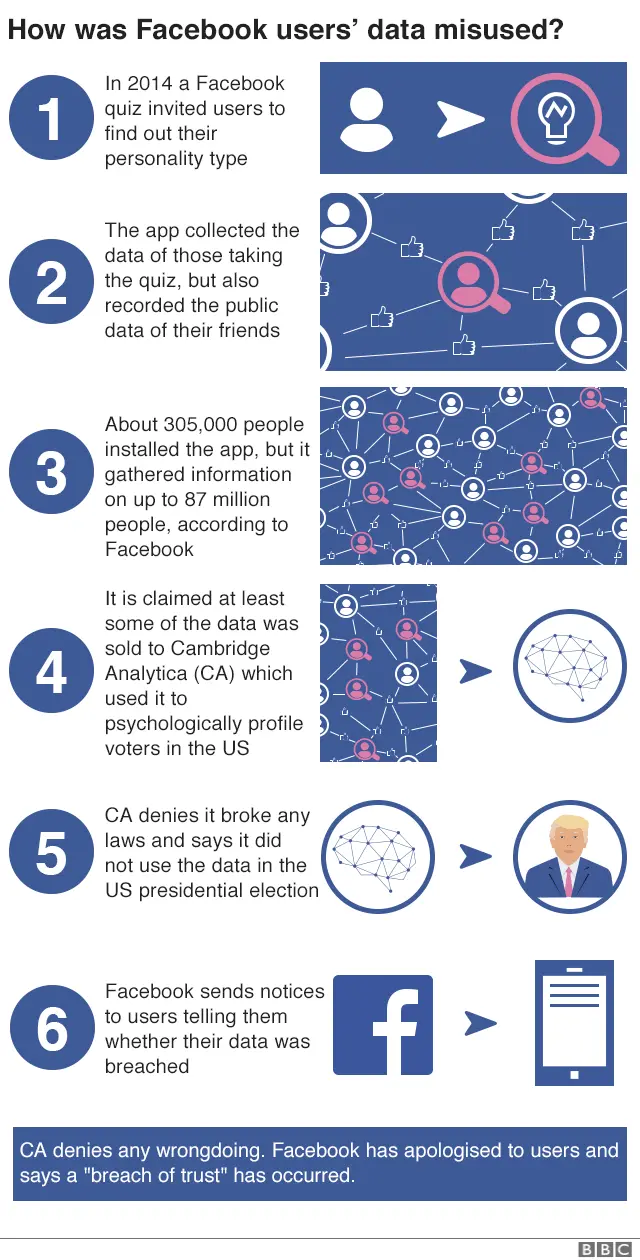Facebook documents seized by MPs investigating privacy breach
 Getty Images/Facebook
Getty Images/FacebookA cache of Facebook documents has been seized by MPs investigating the Cambridge Analytica data scandal.
Rarely used parliamentary powers were used to demand that the boss of a US software firm hand over the details.
The Observer, which first reported the story, said the documents included data about Facebook's privacy controls.
MP Damian Collins later told the BBC that he believed the documents were "highly relevant" to his inquiry. Facebook has demanded their return.
Escorted to Parliament
The documents were intercepted when an executive of US tech firm Six4Three was on a trip to London.
In a highly unusual move the House of Commons serjeant-at-arms was sent to the businessman's hotel and he was given a final warning and a two-hour deadline to comply with the order.
When the executive failed to do so he was escorted to Parliament and warned he risked fines and imprisonment if the documents were not surrendered, the paper said.
The firm is involved in court action against Facebook in the US, where the documents were obtained through legal procedures.
Facebook told the Observer: "The materials obtained by the DCMS committee are subject to a protective order of the San Mateo Superior Court restricting their disclosure.
"We have asked the DCMS committee to refrain from reviewing them and to return them to counsel or to Facebook."
But Damian Collins, chairman of the Commons Digital, Culture, Media and Sport (DCMS) Committee, said he believes the documents - which include emails - contain important information about how Facebook and other parties handle user data.
He said he had written to Facebook stressing the House of Commons had powers to seize documents within UK jurisdiction.
In his email to Facebook public policy vice president Richard Allen, which he posted on Twitter on Sunday evening, Mr Collins said a committee of the House can publish these documents under parliamentary privilege.
Allow X content?
He added: "The committee's interest in the documents we have requested relates to their relevance to our ongoing inquiry into disinformation and fake news.
"As you know, we have asked many questions of Facebook about its policies on sharing user data with developers, how these have been enforced, and how the company identifies activity by bad actors.
"We believe that the documents we have ordered from Six4Three could contain important information about this which is of a high public interest.
"We are also interested to know whether the policies of Facebook, as expressed within these documents, are consistent with the public statements the company has made on the same issues."
Allow X content?
In an email to Mr Collins, also shared on Twitter, Mr Allen said that Six4Three's case against Facebook was "entirely without merit" and should not be taken at "face value".
"We hope you will want to reflect on the core issue behind the complaint... The case being brought by Six4Three is a challenge against our efforts to restrict access to data by apps in 2014/2015.
"On earlier occasions, your committee appeared to endorse this more restrictive approach. If this has now changed, it would be useful to understand why," he wrote.
Mr Allan is due to appear before a DCMS committee hearing on Tuesday where details from the documents could be made public.
Regulatory pressure
Facebook and its founder Mark Zuckerberg have faced intense pressure over the social media giant's use of personal data, the spread of fake news, and, this month, allegations that it hired a PR firm to make claims about the financier George Soros.
Last month the UK data watchdog fined Facebook £500,000 following its investigation into the Cambridge Analytica affair.
Facebook has appealed against the fine, claiming that the watchdog found no evidence that UK users' personal data had been shared inappropriately and the penalty was therefore unjustified.
The Cambridge Analytica scandal stems from the discovery that an academic at the University of Cambridge - Dr Aleksandr Kogan - used a personality quiz to harvest up to 87 million Facebook users' details.
Some of this was subsequently shared with the political consultancy Cambridge Analytica, which used it to target political advertising in the US.
It was initially reported that about 1.1 million UK-based users had had their details exposed.


